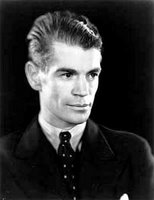 James Whale born 22 July 1889 (d. 1957)
James Whale born 22 July 1889 (d. 1957)James Whale was born in Dudley, the sixth of seven children. Thought not to be strong enough to follow his father and brothers into the local heavy industries, he trained as a cobbler. Having discovered some talent for illustration, he used his additional income to pay for evening classes at the Dudley School of Arts and Crafts.
In 1915, during World War I, he enlisted in the army and was commissioned a Second Lieutenant. He was taken prisoner of war in 1917, and while imprisoned, discovered a talent for staging theatrical productions. After the war, he returned to Birmingham and embarked on a professional stage career. In 1928, he was given the opportunity to direct two fringe performances of R. C. Sherriff's then unknown First World War play Journey`s End, staring the then also largely unknown Laurence Olivier. The production was such a huge success that it transferred to the West End where it played for 600 performances. Whale was invited to direct the Broadway transfer of the play and subsequently, the Hollywood film version in 1930.
 His second film was the first version of Waterloo Bridge - later remade with Olivier and Vivien Leigh. But Whale is best known for his extraordinary and pioneering work in the horror genre - for his third film was Frankenstein (1931).
His second film was the first version of Waterloo Bridge - later remade with Olivier and Vivien Leigh. But Whale is best known for his extraordinary and pioneering work in the horror genre - for his third film was Frankenstein (1931).He subsequently directed The Old Dark House (1932), The Invisible Man (1933) and Bride of Frankenstein (1935) - all extraordinary and groundbreaking films; apparently influenced by German silent cinema, Whale was one of the first directors ever to move the camera through the shot, creating a new fluidity of movement.
His other notable films include the 1936 version of Showboat and The Man In The Iron Mask (1939) - many of his other films were unsuccessful and have faded into obscurity. He walked away from directing in the early 1940s.
A novel about James Whale The Father of Frankenstein by gay writer Christopher Bram formed the basis for the film Gods and Monsters (1998) in which Ian McKellen played Whale.
 In 1929, Whale and David Lewis, a young story editor and later a producer, began a relationship that lasted more than two decades. Although their sexual relationship was an open secret, they lived rather cautiously discreet lives among the English colony in Hollywood. The sexual component of their relationship ended in the early 1950s, but they remained friends until Whale's death. Whale is sometimes described as a closet homosexual, but for the time, he lived quite openly as a gay man in Hollywood.
In 1929, Whale and David Lewis, a young story editor and later a producer, began a relationship that lasted more than two decades. Although their sexual relationship was an open secret, they lived rather cautiously discreet lives among the English colony in Hollywood. The sexual component of their relationship ended in the early 1950s, but they remained friends until Whale's death. Whale is sometimes described as a closet homosexual, but for the time, he lived quite openly as a gay man in Hollywood.In later life, he suffered a series of strokes which left him with memory problems and suffering from depression and loneliness - he seemed unable to put his war experiences behind him. He committed suicide by drowning in his swimming pool in 1957 - he was 67. For years, his death was shrouded in mystery as his suicide note, which read: 'The future is just old age and illness and pain ... I must have peace and this is the only way ...' was withheld until by Lewis, until his own death many years later.